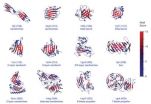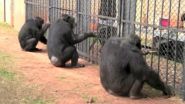(Press-News.org) Children are showing signs of social withdrawal are more susceptible to parental influences than others. These children were also more prone to distress caused by the impacts of guilt-inducing parenting.
The researchers of the University of Jyväskylä, Finland, have found that children showing signs of social withdrawal are more susceptible to parental influences than others. The researchers followed up about 300 children across the first three years of primary school and monitored the children's social skills and problem behaviors. At the same time, mothers' and fathers' parenting styles were assessed. The study was funded by the Academy of Finland and the Alli Paasikivi foundation.
The results showed that children showing signs of social withdrawal in kindergarten were more prone to parental impacts later on in school than others. For example, a low level of maternal affection was evident as an increased level of conduct problems among socially withdrawn children in particular. These children were also more prone to the impacts of guilt-inducing parenting deployed by mothers and fathers: guilt-inducing parenting of either parent increased internalized distress and depressive symptoms clearly more among socially withdrawn children than among other children.
On the other hand, the results surprisingly showed that guilt-inducing parenting deployed by mothers decreased the conduct problems of socially withdrawn children. The researchers suggest that children showing signs of social withdrawal may have a heightened risk of pleasing their parents at the cost of their own well-being.
In guilt-inducing parenting, a parent tries to impact on the child's behavior using psychological means rather than direct limit setting. For example, the parent may remind the child how much effort he/she makes for the child or show how ashamed he/she is because of the child's behavior. In previous research, this kind of parenting has been related to increased anxiety and depressive symptoms among children and adolescents.
INFORMATION:
The study will be published (online version already available) in highly recognized Journal of Child Psychology and Psychiatry.
Online publication: Zarra-Nezhad, M., Kiuru, N., Aunola, K., Zarra-Nezhad, M., Ahonen, T., Poikkeus, A.-M., Lerkkanen M.-K., & Nurmi, J.-E. (2014). Social withdrawal in children moderates the association between parenting styles and the children's own socioemotional development. Journal of Child Psychology and Psychiatry. Online: 2014, May 5.
Link to the publication: http://onlinelibrary.wiley.com/doi/10.1111/jcpp.12251/pdf
More information:
Maryam Zarra-Nezhad (English), email: maryam.zarra-nezhad@jyu.fi
Kaisa Aunola, tel. 040 805 3481 (Finnish/English), email: kaisa.aunola@jyu.fi
Noona Kiuru, tel. 040 805 4740 (Finnish/English), email: noona.kiuru@jyu.fi
Children showing signs of social withdrawal in risk of internalized distress
2014-06-12
ELSE PRESS RELEASES FROM THIS DATE:
Recreational football can treat hypertensive and type 2 diabetes patients
2014-06-12
The studies, published in the acclaimed Scandinavian Journal of Medicine & Science in Sports, show that 24 weeks of twice-weekly recreational football training sessions lower blood pressure and improves heart function in men with high blood pressure and men with type 2 diabetes. Furthermore, men with type 2 diabetes lost 12 % of their abdominal fat and reduced their blood sugar 20% more than inactive control subjects.
These effects are likely to reduce the risk of developing heart diseases including heart failure and myocardial infarction, and the participants had a reduced ...
Does food addiction exist?
2014-06-12
Women with weight problems were more impulsive than average in a food-related psychology test, a new research paper has shown. This suggested that they are more instinctively stimulated by images of food as well as lacking contemplative will power. Further, some women reported food craving even if they had eaten recently, a symptom of possible food addiction.
"All addictions are similar in that the sufferer craves to excess the feel-good buzz they receive from chemical neurotransmitters produced when they eat, gamble, smoke, have sex or take drugs," commented Claus Voegele, ...
Blood product sterilization taken too far?
2014-06-12
Certain processes used to sterilize blood products could potentially cause serious health issues in transfusion recipients, according to an international study published in the journal Platelets and led by Dr. Patrick Provost of Université Laval's Faculty of Medicine and the CHU de Québec Research Center. These processes purportedly alter the blood platelets to the extent of preventing them from carrying out their functions correctly and may be the cause of hemorrhages observed in patients having received treated blood.
The function of platelets goes far beyond their ...
When good people do bad things
2014-06-12
CAMBRIDGE, MA -- When people get together in groups, unusual things can happen — both good and bad. Groups create important social institutions that an individual could not achieve alone, but there can be a darker side to such alliances: Belonging to a group makes people more likely to harm others outside the group.
"Although humans exhibit strong preferences for equity and moral prohibitions against harm in many contexts, people's priorities change when there is an 'us' and a 'them,'" says Rebecca Saxe, an associate professor of cognitive neuroscience at MIT. "A group ...
Study of white sharks in the northwest Atlantic offers optimistic outlook for recovery
2014-06-12
White sharks are among the largest, most widespread apex predators in the ocean, but are also among the most vulnerable. A new study, the most comprehensive ever on seasonal distribution patterns and historic trends in abundance of white sharks (Carcharodon carcharias) in the western North Atlantic Ocean, used records compiled over more than 200 years to update knowledge and fill in gaps in information about this species.
Scientists from NOAA Fisheries and colleagues added recent unpublished records to previously published data to present a broad picture of 649 confirmed ...
Antibodies from the desert as guides to diseased cells
2014-06-12
The use of nanoparticles in cancer research is considered as a promising approach in detecting and fighting tumour cells. The method has, however, often failed because the human immune system recognizes the particles as foreign objects and rejects them before they can fulfil their function. Researchers at the Helmholtz-Zentrum Dresden-Rossendorf (HZDR) and at University College Dublin in Ireland have, along with other partners, developed nanoparticles that not only bypass the body's defence system, but also find their way to the diseased cells. This procedure uses fragments ...
Proliferation cues 'natural killer' cells for job change
2014-06-12
PROVIDENCE, R.I. [Brown University] —The immune system maintains a rich abundance of "natural killer" cells to confront microbial invaders, but as the body gains the upper hand in various infections it sometimes starts to produce even more of the cells. For three decades, scientists haven't understood what purpose that serves. In a new paper, Brown University researchers show one: proliferation helps change the NK cells' function from stimulating the immune response to calming it down, lest it get out of hand.
In a series of experiments now published online in the Journal ...
The transmission of information via proteins could revolutionize drug discovery
2014-06-12
Proteins are chains of amino acids that, when folded into certain structural patterns and also when unfolded, exert functions within cells. Proteins receive signals that are transmitted from one to the next and that are essential for life. However, within a given protein, are there "highways" along which the signals travel, like a in a relay event? That is to say, how is the information transmitted in a given protein? "This is one of the key questions in biophysics," says Xavier Salvatella, ICREA Professor at the Institute for Research in Biomedicine (IRB Barcelona) and ...
Tiny plants ride on the coattails of migratory birds
2014-06-12
Since the days of Darwin, biologists have questioned why certain plants occur in widely separated places, the farthest reaches of North American and the Southern tip of South America but nowhere in between. How did they get there? An international team of researchers have now found an important piece of the puzzle: migratory birds about to fly to South America from the Arctic harbor small plant parts in their feathers.
In the past several decades, scientists have discovered that the North – South distributions of certain plants often result from a single jump across the ...
Chimpanzees spontaneously initiate and maintain cooperative behavior
2014-06-12
VIDEO:
Chimpanzees spontaneously cooperate with multiple partners of their choosing to remove a barrier and pull in a tray baited with food.
Click here for more information.
Without any pre-training or restrictions in partner choice among chimpanzees, researchers at the Yerkes National Primate Research Center, Emory University, found for the first time that chimpanzees housed in a socially complex, contained setting spontaneously cooperate with multiple partners of their choosing. ...



